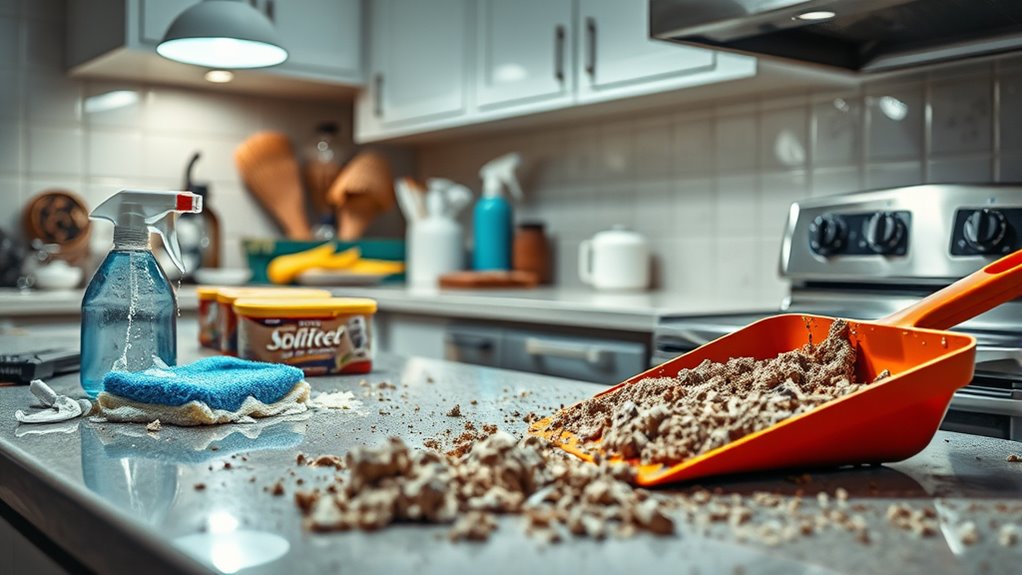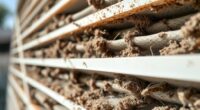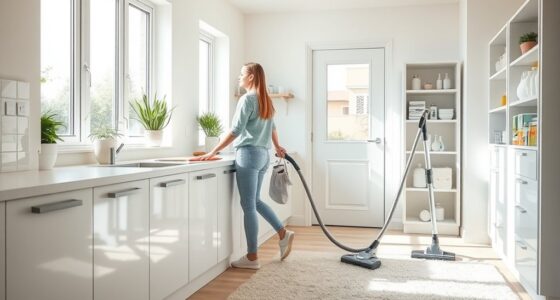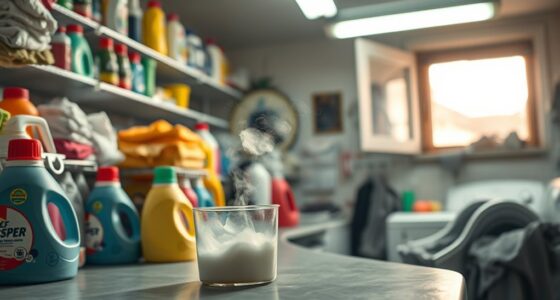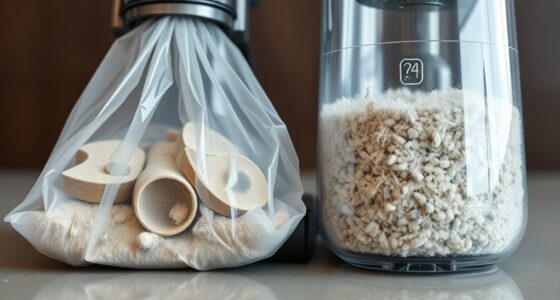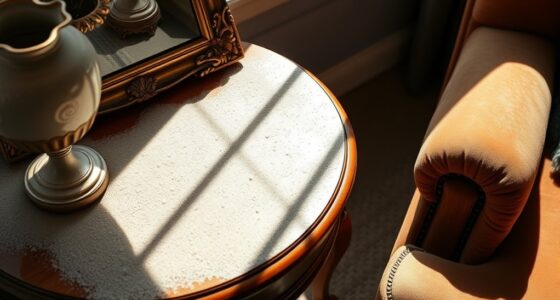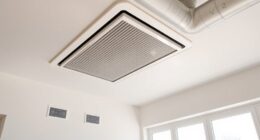Using vinegar on hardwood floors can cause long-term damage and dull the finish, while overusing baking soda in carpets traps dirt and moisture, making stains worse. Relying only on wet wipes spreads germs and leaves residues, and mixing cleaning products can release dangerous fumes or damage surfaces. Old or expired sprays lose effectiveness, and scrubbing delicate surfaces with hard brushes risks scratches. Excessive vacuuming without proper maintenance reduces effectiveness. Stick around to learn how to avoid these common cleaning mistakes.
Key Takeaways
- Using vinegar on hardwood floors can leave residues and damage the finish, making floors dirtier over time.
- Overusing baking soda in carpets can trap dirt and moisture, leading to increased stains and mold growth.
- Relying solely on wet wipes spreads germs and leaves residues that attract more dirt.
- Mixing cleaning products like bleach and ammonia creates toxic fumes, worsening cleanliness and health risks.
- Excessive or improper vacuuming without maintenance reduces suction and disperses dirt, making surfaces dirtier.
Using Vinegar on Hardwood Floors
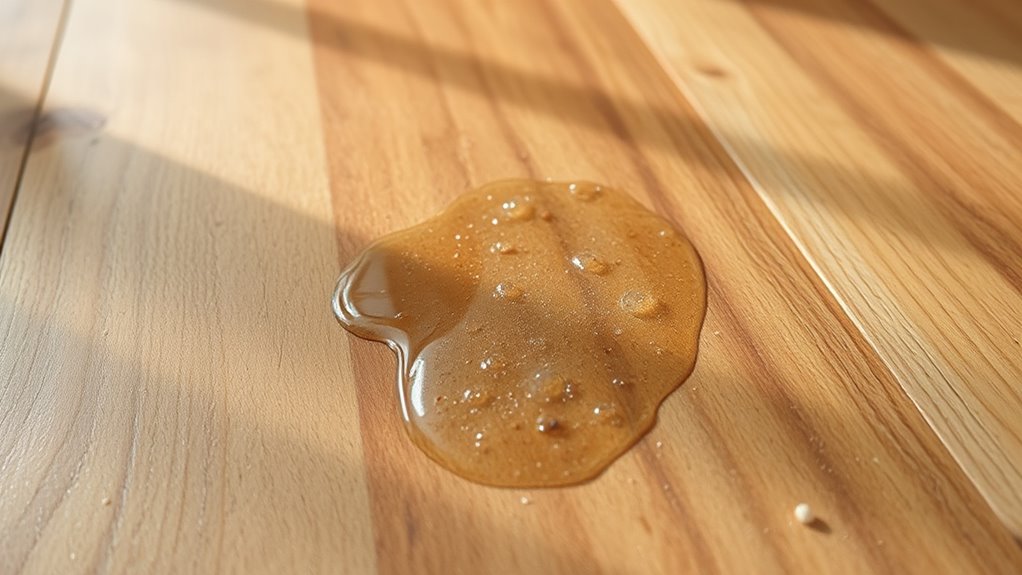
Although vinegar is often touted as a natural cleaner, using it on hardwood floors can do more harm than good. Vinegar residue can seep into the wood’s surface, damaging the delicate hardwood finish over time. Its acidic nature may dull the shine and strip away protective coatings, leaving your floors looking dull and worn. Even if you dilute vinegar, residue can still linger if not rinsed thoroughly, causing long-term harm. You might think you’re cleaning effectively, but the acidity can weaken the finish and lead to discoloration or warping. Additionally, applying improper cleaning methods can cause paint defects like dullness or uneven surfaces. Instead of vinegar, opt for cleaners specifically designed for hardwood. This helps preserve your floors’ beauty and ensures they stay protected against damage caused by improper cleaning methods.
Overusing Baking Soda on Carpets
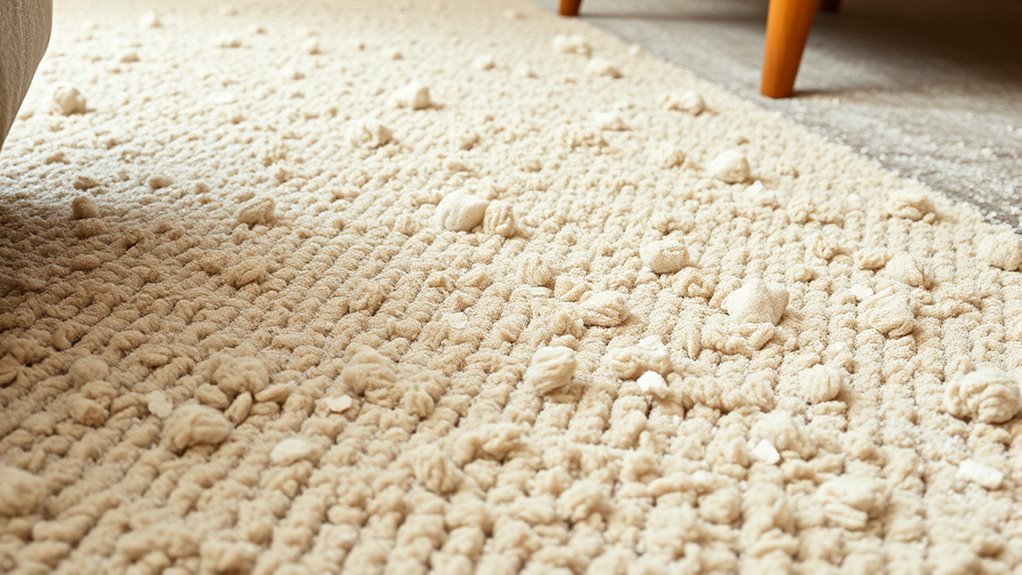
While baking soda can effectively absorb odors and freshen carpets, overusing it can backfire. Excess baking soda can settle deep into carpet fibers, making it harder to vacuum out completely. This buildup can trap dirt and moisture, leading to more stains or mold growth over time. Instead of helping, too much baking soda can create a dusty residue that clings to fibers, reducing carpet lifespan. Proper cleaning techniques are essential to maintain carpet health and appearance.
Relying Solely on Wet Wipes for Surfaces
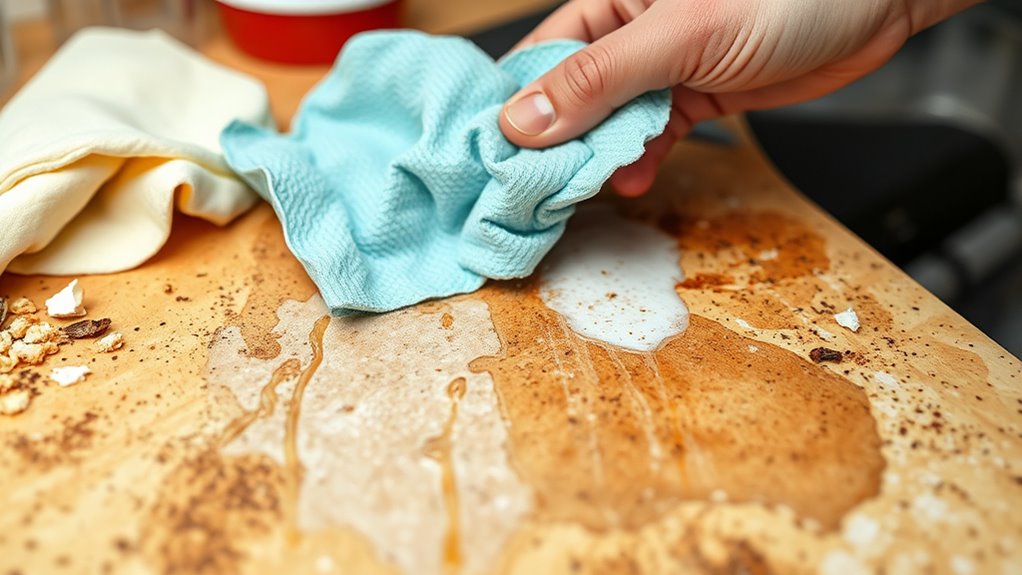
Relying only on wet wipes for cleaning surfaces can spread germs instead of eliminating them. They often leave behind residual stains that are harder to remove over time. Using wipes as your sole cleaning method might do more harm than good. Additionally, overuse of wipes can contribute to microbial resistance, making germs harder to eradicate.
Spreading Germs More
Using only wet wipes to clean surfaces can actually spread germs rather than eliminate them. If you don’t properly dispose of used wipes or reuse them across different areas, you risk transferring bacteria instead of killing it. Relying solely on wipes ignores effective methods like antibacterial sprays or UV sterilization, which target germs more thoroughly. Wet wipes can also trap bacteria in their fibers, making cleaning less effective. To avoid this, always follow up with proper disinfectants and clean cloths. Remember, improper cleaning can create a false sense of sanitation, allowing germs to multiply. Additionally, electric dirt bikes with high horsepower can produce significant vibrations that may cause surfaces to loosen or crack if not cleaned properly, highlighting the importance of thorough cleaning techniques.
Leaving Residual Stains
Have you ever noticed how wet wipes leave behind stubborn stains on surfaces? Relying solely on them for cleaning can actually worsen the situation. Wet wipes often smear dirt and grime, causing residue buildup rather than removing it. This makes stain removal more difficult over time, leaving surfaces looking dull and dirty. Instead of effectively cleaning, you might just be spreading the mess around. The moisture in wipes can trap dirt, making stains worse and harder to eliminate. Plus, the residue left behind can attract more dust and grime, creating a cycle of dirt buildup. For proper stain removal, use appropriate cleaning solutions and microfiber cloths. Relying only on wet wipes doesn’t cut it; it can leave your surfaces dirtier than before. Incorporating sustainable materials and proper cleaning techniques ensures a cleaner, healthier environment.
Mixing Different Cleaning Products Without Knowing
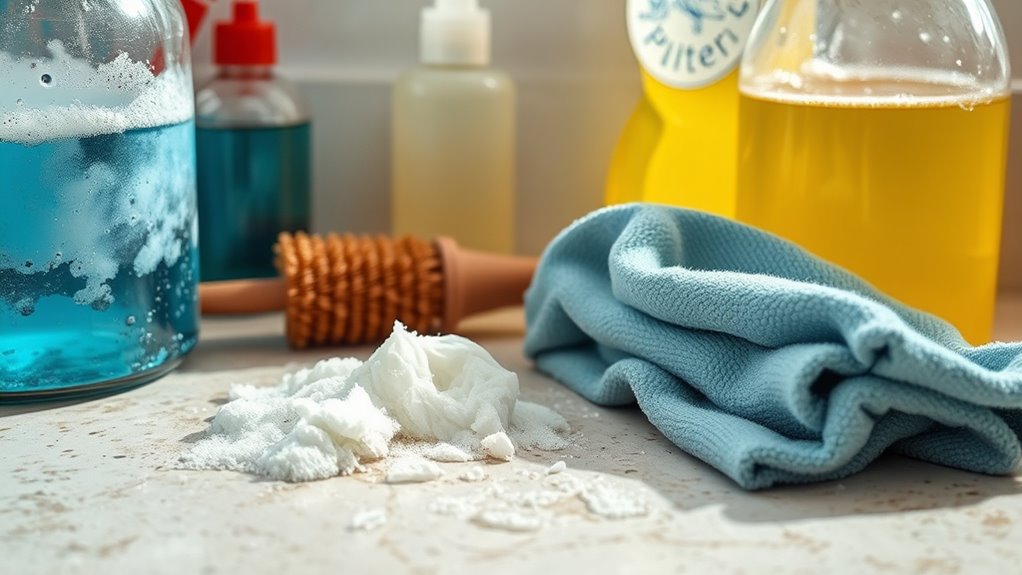
Mixing different cleaning products without knowing what you’re doing can lead to dangerous chemical reactions that worsen the mess instead of cleaning it up. Not all products are compatible, and combining certain chemicals can release toxic fumes or damage surfaces. Always check labels for product compatibility to avoid unintended reactions. Additionally, understanding the technological differences between cleaning agents can help you choose the right product for each surface.
Here are some common pitfalls:
- Mixing bleach with ammonia creates toxic chloramine vapors.
- Combining vinegar and baking soda causes a fizzy reaction, but doesn’t clean better.
- Using different drain cleaners can cause dangerous heat and reactions.
- Mixing different disinfectants may neutralize their effectiveness.
- Adding acids to alkaline cleaners can produce harmful gases.
Always read labels carefully, and never assume all cleaning products are safe to combine. When in doubt, stick to one product at a time for safe and effective cleaning.
Using Old or Expired Cleaning Sprays
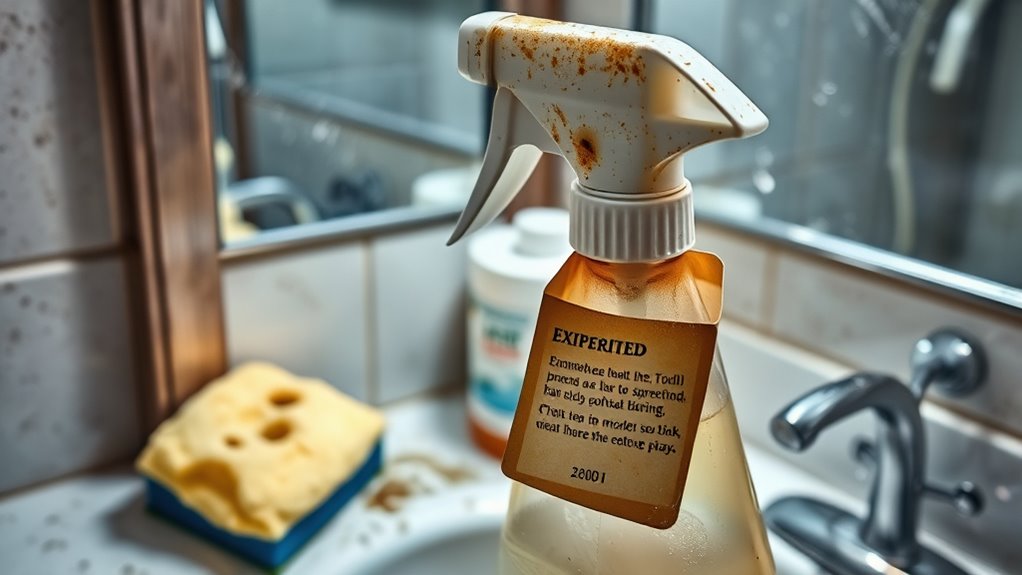
Using old or expired cleaning sprays can seriously reduce their effectiveness, leaving stains and dirt behind. You might also risk damaging surfaces if the chemical composition has changed over time. It’s best to check expiration dates to avoid making your cleaning efforts counterproductive. Additionally, degraded chemicals may lose their antimicrobial properties, making them less effective at sanitizing surfaces.
Reduced Cleaning Power
Over time, cleaning sprays can lose their effectiveness, especially when they sit unused for months or years. This diminishes their disinfectant effectiveness, making them less capable of killing germs and bacteria. Using expired sprays regularly reduces cleaning frequency because you might need to reapply or scrub harder to see results. Here are some signs your spray has lost potency:
- The spray no longer emits a fine mist
- Smell of the product weakens or disappears
- Surfaces remain sticky or grimy after cleaning
- Labels indicate an expiration date passed
- You notice more dirt buildup despite use
Relying on old sprays gives a false sense of cleanliness, leaving germs behind and risking cross-contamination. Always check expiration dates to ensure your disinfectant effectiveness stays at its peak.
Potential Surface Damage
Even when cleaning sprays are past their expiration date, they can still pose a risk to your surfaces. Expired sprays may lose their effectiveness but can also cause surface etching or finish stripping. Certain chemicals in old cleaners can react unpredictably, damaging delicate finishes or etching into glass and polished surfaces. Using outdated products risks leaving behind dull spots or permanent marks that are hard to restore. If a spray’s ingredients break down over time, they may become more aggressive, increasing the chance of surface damage. Always check labels and avoid using expired cleaners on sensitive materials. Properly disposing of outdated sprays helps prevent accidental damage and keeps your surfaces looking their best without risking costly repairs. Additionally, trust issues with cleaning products can arise if you’re unaware of their chemical stability, emphasizing the importance of proper storage and disposal.
Scrubbing With Hard Brushes on Delicate Surfaces
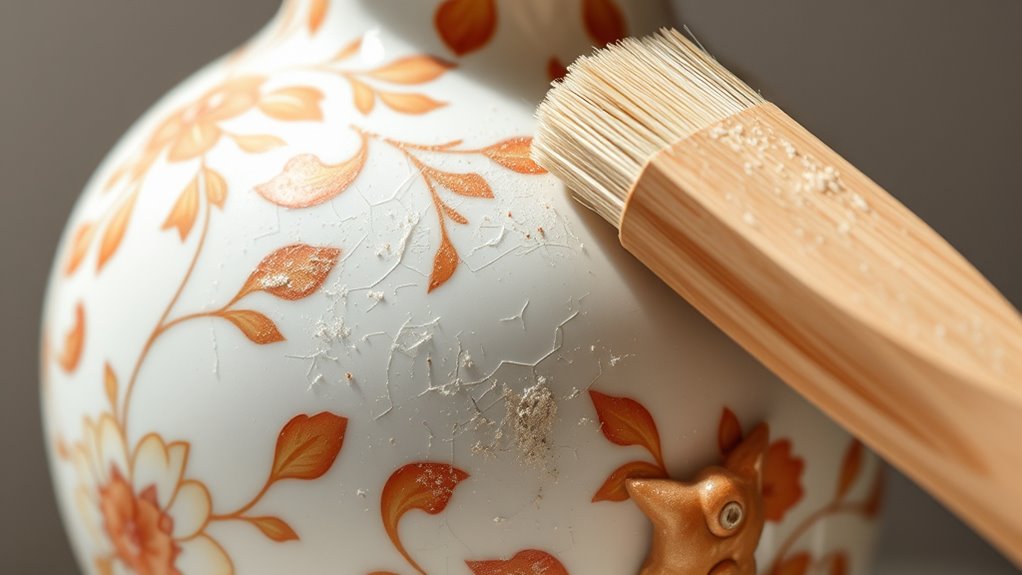
Scrubbing with hard brushes on delicate surfaces can quickly cause more harm than good. Instead of gentle cleaning, you risk scratches or damage that worsens the mess. Hard bristles can gouge soft materials, making stains harder to remove later. To avoid this, always opt for soft bristled brushes or cloths designed for delicate surfaces. These tools provide effective cleaning without compromising surface integrity. Remember, gentle cleaning methods are more effective long-term and prevent costly repairs. Using appropriate cleaning tools tailored for specific surfaces ensures better results and preserves your surfaces’ condition.
Excessive Vacuuming Without Proper Maintenance
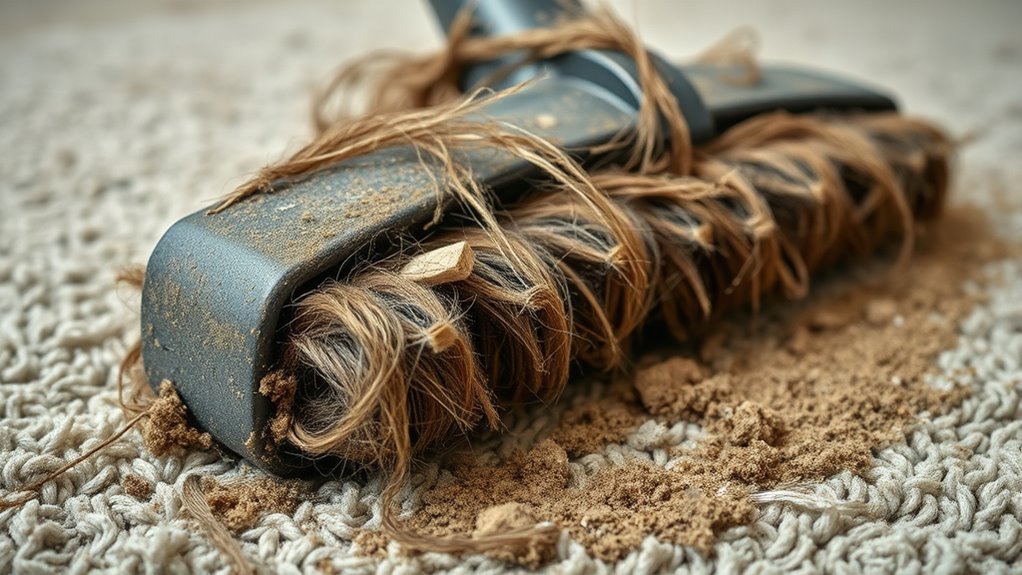
Using hard brushes on delicate surfaces can cause damage, and similarly, neglecting proper maintenance of your vacuum can lead to bigger problems. Excessive vacuuming without regular upkeep reduces efficiency and risks damage. If you don’t replace your vacuum bag when full, airflow decreases, making your vacuum work harder and less effectively. Similarly, skipping vacuum filter cleaning allows dust buildup, reducing suction and spreading allergens. Regular maintenance is essential to prevent performance decline and maintain optimal cleaning results. To keep your vacuum running smoothly, replace the vacuum bag regularly and clean the vacuum filter often. Neglecting these steps hampers performance and can make your cleaning efforts counterproductive.
Frequently Asked Questions
Can Homemade Cleaning Solutions Damage My Household Items?
You might wonder if DIY solutions can harm your household items. While homemade dangers vary, using the wrong ingredients or concentrations can cause damage—like discoloration or material degradation. Always research and test small areas first. DIY solutions are cost-effective, but they’re not foolproof. Be cautious, follow trusted recipes, and avoid harsh substances to protect your belongings from unintended harm.
Are There Safer Alternatives to Harsh Chemical Cleaners?
If you’re wondering about safer options than harsh chemical cleaners, consider natural disinfectants like vinegar or hydrogen peroxide, which are effective and eco-friendly alternatives. These substances help disinfect surfaces without the risks associated with strong chemicals, making them safer for your family and the environment. You can confidently use these eco-friendly alternatives for cleaning, knowing you’re reducing exposure to harmful substances while keeping your home clean and healthy.
How Often Should I Replace My Cleaning Tools?
Imagine you’re living in the age of the Great Depression—your cleaning tools need regular attention. You should replace sponges every 1-2 weeks, and mops or brushes every few months. Proper tool maintenance, like washing cloths and disinfecting brushes, keeps your cleaning frequency effective. Don’t wait until tools look worn; regular replacement prevents dirt buildup and bacteria growth, ensuring your home stays fresh and healthy.
What Are Signs of Overusing Cleaning Products?
You might notice signs of overusing cleaning products when surfaces develop chemical buildup, making them look dull or sticky. Overapplication can cause surface damage, such as discoloration or scratches, especially on delicate materials. If you see persistent residue or experience increased allergies or skin irritation, it’s a sign you’ve used too much. Always follow instructions and opt for eco-friendly options to avoid damaging surfaces and reduce chemical buildup.
Is It Safe to Mix Natural and Chemical Cleaners?
Mixing natural and chemical cleaners isn’t safe because it can cause dangerous reactions. You might think it’s okay, but combining different substances can release toxic fumes or cause skin irritation, especially if you have allergic sensitivities. Always read labels and stick to one type of cleaner at a time. If you’re unsure, it’s best to test in a small area or consult a professional to avoid any health risks.
Conclusion
Think of cleaning like gardening—you can’t just toss any fertilizer or tool and expect perfect blooms. I once used vinegar on my hardwood floors, only to realize it left streaks. Avoid the pitfalls I’ve learned the hard way by sticking to proper methods. When you use the right products carefully, your home shines without making things dirtier. Remember, cleaning is an art—less is often more, and patience yields the best results.
